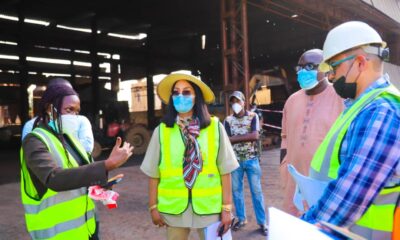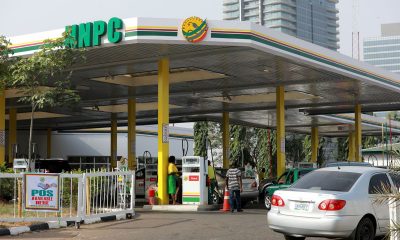Business
Stopping fuel importation will create monopoly, sustain fuel crisis – Marketers

Stopping fuel importation will create monopoly, sustain fuel crisis – Marketers
Three major oil marketers in the country, yesterday, asked the Federal High Court in Abuja to stop what they described as plot by Dangote Petroleum Refinery and Petrochemicals FZE, to monopolise the energy sector of the economy.
The marketers, including AYM Shafa Limited, A. A. Rano Limited and Matrix Petroleum Services Limited, maintained that allowing Dangote Refinery to takeover the oil sector would spell doom for the country.
However, efforts made to reach the Group Head, Communications, Dangote Group, Mr. Anthony Chiejina, last night, were unsucces-sful as several calls made to his known mobile phone were unanswered, while text and WhatsApp messages were not also responded to at press time.
The companies took the position in a reply they filed to challenge the competence of the suit Dangote’s firm filed to nullify licenses they secured to import refined petroleum products into the country.
The marketers were cited as defendants in the suit marked: FHC/ABJ/CS/1324/2024, which also has the Nigeria Midstream and Downstream Petroleum Regulatory Authority, NMDPRA, and the Nigeria National Petroleum Corporation Limited, NNPC, as defendants.
It will be recalled that Dangote Refinery had, in its suit, queried the propriety of licences issued to other key oil marketers to bring refined petroleum products into the country when it has not recorded any shortfall in its own operations.
According to the plaintiff, NMDPRA acted in breach of Sections 317(8) and (9) of the Petroleum Industry Act, PIA, by issuing licenses for the importation of petroleum products to the defendants.
READ ALSO:
- Tens of thousands of fighters ready to battle Israel says Hezbollah
- Electricity: DisCos increase prices of prepaid meters by 28.03%
- Naira exchanges for N1,720/$ in parallel market
The plaintiff told the court that the licences were issued to the defendants, “despite the production of AGO and Jet-A1 that exceeds the current daily consumption of petroleum products in Nigeria by Dangote Refinery.”
It, therefore, prayed the court to award N100billion in damages against the NMDPRA for allegedly continuing to issue import licenses to NNPCL and the other defendants for the import of petroleum products, such as Automotive Gas Oil, AGO, and jet fuel (aviation turbine fuel) into Nigeria.
Specifically, Dangote Refinery, among other things, applied for an order of injunction, restraining the 1st defendant (NMDPRA) from further issuing and/or renewing import licenses to the 2nd to 7th defendants or other companies for the purpose of importing petroleum products.
It further sought an order of court directing the 1st defendant to seal off all tank farms, storage facilities, warehouses, and stations used by the defendants for the storage of all refined petroleum products imported into Nigeria.
“An order of mandatory injunction directing the 1st defendant to withdraw immediately all import licenses issued to the 2nd-7th defendants and other companies other than the plaintiff and other local refineries for the purpose of importing refined petroleum products into Nigeria.
“An order of injunction restraining the 1st defendant from imposing and demanding a 0.5% levy meant for off-takers of petroleum products directly and an additional 0.5% wholesale levy in favour of MDGIF or any other levy or sum against the plaintiff.”
However, in their reply to the suit, dated November 5, 2024, the three marketers told the court that the plaintiff does not produce adequate petroleum products for the daily consumption of Nigerians, saying there was nothing before the court to prove the contrary.
The defendants told the court that they were well qualified and entitled to be issued a licence by the 1st defendant to import petroleum products into the country within the provisions of Section 317(9) of the PIA.
They argued that vesting the plaintiff with the power of monopoly in Nigeria’s petroleum industry, as it was seeking through the legal action, would kill competitive pricing of petroleum products in the country, further deteriorate Nigeria’s critically ailing economy “and unleash untold hardship on Nigerians, all of which constitute a recipe for disaster in the polity.
“That if Nigeria puts all her energy eggs in one basket by stopping importation of petroleum products and allowing the Plaintiff to be the sole producer and supplier of petroleum products in Nigeria, with liberty to determine the prices at which it supplies the products, the prices of petroleum products in Nigeria will continue to rise and energy security will elude Nigeria.
“That in the event of any breakdown in or obstruction to the production chain of the plaintiff which stops it from producing, Nigeria will be thrown into energy crises as Nigeria does not have the reserves that would last it for the at least 30 days that it would need to order, pay for, freight and import refined products into tanks in Nigeria.
“That amid the glaring absence of any credible and demonstrable proof that the Plaintiff refines and supplies adequate petroleum products for the daily use/consumption of Nigerians, giving the plaintiff judicial imprimatur to be the sole supplier of refined petroleum products to Nigerians, thereby encouraging monopoly in a major aspect of Nigeria’s oil industry, is a recipe for disaster in Nigeria’s energy sector,” the defendants added.
They insisted that granting the reliefs sought by the plaintiff, which is aimed at making it a monopolist in Nigeria’s petroleum sector, would leave Nigeria and Nigerians at the mercy of the olaintiff, with respect to availability and cost of purchasing petroleum products in the country.
More so, the defendants told the court that they were fully qualified for the import licences issued to them by the 1st Defendant, as they duly met all the legal requirements.
“The import licences lawfully and validly issued to the defendants did not in any way whatsoever, cripple the Plaintiff’s business or its refinery.
“The import licences issued to the defendants by the 1st defendant are in line with the provisions of Petroleum Industry Act, 2021, the Federal Competition and Consumer Protection Act, 2018 and other relevant laws,” the defendants averred.
Justice Inyang Ekwo had earlier adjourned the matter till January 20, 2025, to enable the parties explore an out-of-court settlement of the dispute, even as the plaintiff expressed its readiness to withdraw the suit.
Stopping fuel importation will create monopoly, sustain fuel crisis – Marketers
Business
Dangote urges wealthy Nigerians to invest in industries, not luxury cars, private jets

Dangote urges wealthy Nigerians to invest in industries, not luxury cars, private jets
Africa’s richest man, Aliko Dangote, has called on wealthy Nigerians to redirect funds currently spent on luxury cars and private jets into industrial investments that can generate jobs and foster sustainable economic growth.
In a widely shared interview, the Dangote Group chairman warned that the country’s elite have increasingly prioritized lavish spending over productive ventures. “If you have money to buy a Rolls-Royce, you should take that money and put up an industry in your locality or anywhere there is need,” Dangote said.
He expressed concern over the number of private jets parked at local airports, arguing that the resources tied up in such assets could instead create employment opportunities.
READ ALSO:
- Mohamed Salah Slams Liverpool Boss Arne Slot, Hints at Anfield Exit Ahead of AFCON Departure
- Indonesia Flood Disaster: Death Toll Exceeds 900 as Search for Hundreds Continues
- Russia Intensifies Airstrikes on Ukraine as Zelensky, Trump Envoys Advance Peace Talks
Dangote highlighted Nigeria’s growing population, with an estimated 7.8 million births annually, stressing that both government and private sector actors must invest in infrastructure, power, and productive businesses.
Acknowledging the country’s high taxes, he maintained that businesses must still meet their obligations. “For a company like ours, the tax we pay is too much, but we don’t mind… What we are asking for is an enabling environment, but we too must do our civic duties,” he said.
He also urged Nigerians to prioritize domestic investment over foreign capital, noting that attracting investment depends on good policy and rule of law. “We should stop calling for foreign investors because there’s no foreign investor anywhere. What attracts investment is good policy and rule of law,” Dangote added.
Dangote urges wealthy Nigerians to invest in industries, not luxury cars, private jets
Business
Imo Economic Summit: Aliko Dangote Vows to Become State’s Largest Investor

Imo Economic Summit: Aliko Dangote Vows to Become State’s Largest Investor
OWERRI — Africa’s richest man, Aliko Dangote, has assured Imo State Governor Hope Uzodimma that the Dangote Group is prepared to become one of the biggest investors in Imo State, reaffirming the conglomerate’s commitment to expanding its footprint in Nigeria.
Speaking on Thursday during the opening session of the Imo Economic Summit 2025, Dangote called on the state government to specify key sectors requiring investment, promising immediate action once directives are given.
Dangote, who described Governor Uzodimma as a long-time friend, commended him for fostering an enabling environment for business and economic growth in the state.
READ ALSO:
- NSCDC rejects VIP protection requests from senators as demand surges after police withdrawal
- Edo Assembly Moves to Arrest Obaseki, Others Over MOWAA, Radisson Hotel Probe
- Three Top Contenders to Replace William Troost-Ekong as Super Eagles Captain
“We will be one of your biggest investors in Imo. So please tell me the area to invest and we will invest,” he said.
The African industrialist also encouraged Nigerian entrepreneurs to focus on developing their home regions, stressing that sustainable economic growth cannot depend on foreign capital alone.
“What attracts foreign investors is a domestic investor. Africa has about 30 percent of the world’s minerals. We are blessed,” he noted.
Dangote further highlighted progress at the Dangote Refinery, announcing that the facility is on track to achieve a 1.4 million barrels-per-day production capacity, making it the largest single-train refinery in the world.
The assurance marks a significant boost for Imo State’s investment outlook as the government continues efforts to strengthen its economy and attract large-scale private sector participation.
Imo Economic Summit: Aliko Dangote Vows to Become State’s Largest Investor
Auto
Court of Appeal Affirms Ruling Barring VIO from Seizing Vehicles or Fining Motorists

Court of Appeal Affirms Ruling Barring VIO from Seizing Vehicles or Fining Motorists
The Court of Appeal, Abuja, on Thursday, upheld a previous Federal High Court judgment prohibiting the Vehicle Inspection Officers (VIO) and the Directorate of Road Traffic Services (DRTS) from confiscating vehicles or imposing fines on motorists without lawful authority.
A three-member panel of appellate justices, led by Justice Oyejoju Oyewumi, dismissed the appeal filed by the VIO, describing it as lacking merit and affirming the October 16, 2024 ruling of the high court.
The original suit, marked FHC/ABJ/CS/1695/2023, was filed by public interest lawyer Abubakar Marshal, who alleged that he was unlawfully stopped and had his vehicle confiscated by VIO officials at Jabi District, Abuja, on December 12, 2023. He contended that the action was a violation of his fundamental rights.
READ ALSO:
- FG secures release of three Nigerians detained in Saudi Arabia
- Groups Reject Senator’s Call for Removal of NSA Nuhu Ribadu
- US authorities arrest Nigerian CEO Cashmir Chinedu Luke for alleged $7m VA fraud
Justice Nkeonye Maha of the Federal High Court had declared that no law empowers the VIO to stop, seize, impound, or fine motorists, and granted a perpetual injunction restraining the agency and its agents from further violating citizens’ freedom of movement, presumption of innocence, and right to own property.
The court held that only a court of competent jurisdiction can impose fines or sanctions on motorists. It further ruled that the actions of the Respondents violated Section 42 of the 1999 Constitution and relevant articles of the African Charter on Human and Peoples’ Rights.
Although the applicant had sought N500 million in damages and a public apology, the court awarded him N2.5 million. Respondents included the Director of the Directorate of Road Traffic Services, the Abuja Area Commander, the team leader, and the Minister of the Federal Capital Territory.
The appellate court’s decision confirms that the VIO and DRTS cannot legally harass motorists, reinforcing citizens’ constitutional rights on the road.
Court of Appeal Affirms Ruling Barring VIO from Seizing Vehicles or Fining Motorists
-

 metro3 days ago
metro3 days agoSenate Launches Emergency Probe into Widespread Lead Poisoning in Ogijo, Lagos/Ogun
-

 News3 days ago
News3 days agoBREAKING: Tinubu Sends Fresh Ambassadorial Nominations to Senate, Names Ibas, Ita Enang, Dambazau
-

 Auto3 days ago
Auto3 days agoCourt of Appeal Affirms Ruling Barring VIO from Seizing Vehicles or Fining Motorists
-

 Sports1 day ago
Sports1 day ago2026 FIFA World Cup Draw: England Draw Croatia as Brazil Face Morocco in Tournament Opener
-

 News3 days ago
News3 days agoUS authorities arrest Nigerian CEO Cashmir Chinedu Luke for alleged $7m VA fraud
-

 metro3 days ago
metro3 days agoFG secures release of three Nigerians detained in Saudi Arabia
-

 metro3 days ago
metro3 days agoNed Nwoko vows legal action against rising online harassment, criminal defamation
-

 metro3 days ago
metro3 days agoBuratai Defends Nigeria’s Resilience, Says Nation Is “Rising, Not Failing” Despite Insecurity











